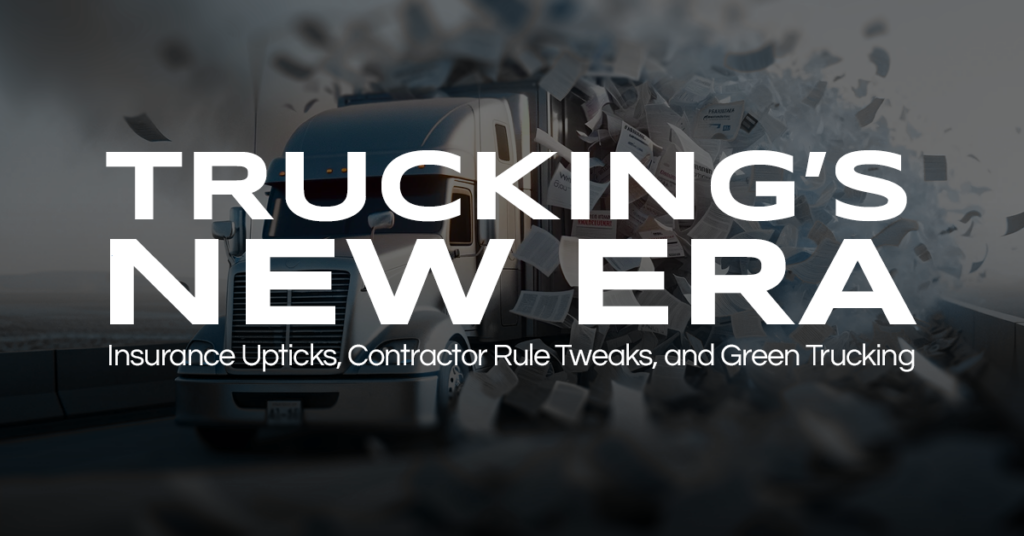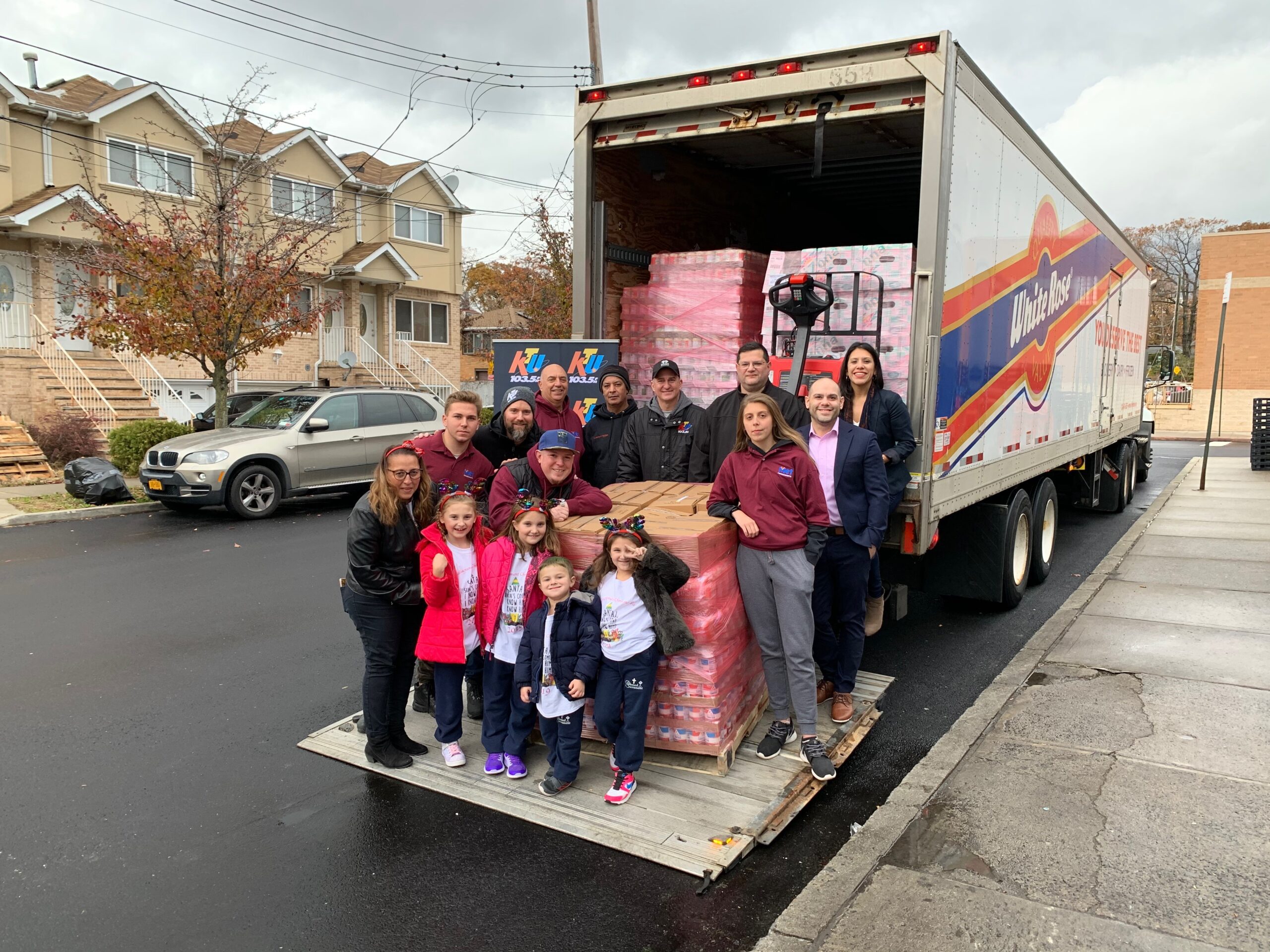
As we embark on another year in the dynamic world of trucking, recent developments signal a transformative period for the industry. From legislative halls to the roads of Pennsylvania, change is in the air, driven by a commitment to safety, sustainability, and economic viability. Join us as we delve into these pivotal shifts, exploring how they intertwine to redefine the future of trucking.

Hiking Insurance Minimums for Truckers
In a now-familiar move in Congress, a new bill aims to significantly raise the minimum liability insurance for interstate motor carriers. This change, from the current $750,000 to a substantial $5 million, could reshape the financial landscape for the trucking industry. Introduced by Representatives Jesus “Chuy” Garcia and Hank Johnson, the “Fair Compensation for Truck Crash Victims Act” marks another step in an ongoing legislative journey.
Adjusting for Inflation: A Responsive Measure
The bill stands out for its approach to tie insurance minimums with inflation, specifically considering healthcare and related expenses. This proactive measure ensures that the legislation remains relevant and effective in the face of economic changes. Authored by Garcia, who previously penned the INSURANCE Act, this bill also involves a collaborative effort between the Secretary of Transportation and the Bureau of Labor Statistics to regularly update these minimums.
A Quest for Justice and Protection
The driving force behind this bill is the desire to deliver justice and safeguard communities. Garcia emphasizes the need to protect families from the overwhelming financial and emotional aftermath of truck crashes. By requiring trucking companies to hold sufficient insurance, the bill aims to prevent families from financial ruin due to accidents beyond their control. With notable support from various representatives, this initiative seeks to bring about significant change in the trucking industry.
🔗 Explore the full details of the trucking insurance bill here.

The Final Ruling: Minor but Meaningful Adjustments
After extensive anticipation, the Department of Labor (DOL) has finally unveiled its finalized independent contractor rule. While largely mirroring the proposed version, it introduces a few nuanced changes, seen as modestly positive for the trucking industry. The rule, essentially an administrative guide for the Wage and Hour division of the DOL, is set to play a critical role in resolving classification disputes.
Industry Reactions: A Spectrum of Opinions
Leading analyst and attorney Richard Reibstein, who specializes in independent contractor issues, noted the lack of significant surprises in the rule. Despite over 55,000 comments during the public feedback phase, only minor tweaks were made. The American Trucking Associations (ATA), however, expressed severe criticism, with ATA President Chris Spear decrying the rule as detrimental to the freedom and livelihood of many truckers. In contrast, Reibstein highlighted the regulatory nature of the rule and its limited influence in the eyes of the court.
Subtle Yet Significant Shifts
The rule’s treatment of worker investments, particularly in the trucking sector, marks a noteworthy shift. The DOL has now adopted a more qualitative approach to assessing investments, such as truck ownership. This change could increase the likelihood of truckers being classified as independent contractors. The DOL’s revised stance, aligning closer with the industry’s perspective, suggests a more nuanced understanding of the trucking business model.
Balancing Six Key Factors
The rule retains the six primary factors from the Trump-era guidelines but eschews any hierarchy among them, favoring a balanced, totality-of-the-circumstances approach. This includes assessing the role of services in the employer’s business, investment in facilities, degree of control, profit and loss opportunities, initiative and foresight, and the permanence of the relationship. The Biden administration’s rule also acknowledges specialized skills like holding a CDL (Commercial Driver’s License), potentially benefiting the trucking industry in classification disputes.
Legal Landscape and Future Implications
While the DOL’s rule is a significant regulatory development, it’s not the final word on independent contractor status — that power lies with the courts. The rule’s influence is shaped by its alignment with prior court decisions and its status as an administrative interpretation rather than a concrete law. As the trucking industry adapts to these changes, the real impact will unfold in future legal interpretations and industry responses.
🔗 Explore the details of the new independent contractor rule here.

Pioneering Eco-Friendly Transportation in Pennsylvania
Watsontown Trucking has received a substantial boost in its eco-friendly endeavors, securing nearly $1.8 million from the Pennsylvania Department of Environmental Protection. This funding, part of the state’s ambitious $39.6 million Medium and Heavy-Duty Zero-Emission Vehicle Pilot Grant, is a significant stride towards cleaner transportation.
A Focus on Zero-Emission Vehicles
The grant is earmarked for replacing diesel fleets with zero-emission vehicles (ZEVs) and installing electric vehicle charging stations at Watsontown’s Milton facility. The company plans to replace five Class 8 freight trucks and add two fast EV charging stations, aligning with the state’s goal to reduce carbon emissions from transportation.
Driving PA Forward Initiative
This grant, a component of the Driving PA Forward program under the Shapiro administration, aims to transition from older, high-polluting diesel engines to clean transportation technologies. Jessica Shirley, the state DEP’s interim acting secretary, emphasized the importance of clean air and the role of this initiative in addressing air quality challenges in Pennsylvania.
Impacting Local Communities
The grant not only supports environmental goals but also focuses on benefiting underserved and disproportionately impacted communities. The new trucks will operate in Milton, Sunbury, Lewisburg, Northumberland, and areas serving Watsontown’s clients. This move is set to have a positive local impact, both environmentally and economically.
Future Prospects: Beyond Local Shuttle Operations
Steve Patton, president of Patton Logistics, expressed gratitude for the state’s recognition of their commitment to reducing their carbon footprint. While Watsontown currently operates five ZEVs for local shuttle operations in Dublin, Virginia, the company looks forward to expanding the role of these vehicles. Patton acknowledges the need for more robust infrastructure to support longer hauls and over-the-road applications, a goal that this grant significantly propels forward.
A Milestone in Environmental Progress
This investment in Watsontown Trucking is a key step in Pennsylvania’s journey towards a cleaner, more sustainable future. It exemplifies how state initiatives can effectively catalyze private sector efforts in environmental stewardship, making it a model for others to follow.
🔗 Learn more about Watsontown Trucking’s zero-emission initiative here.
Before You Hit The Road…
The trucking industry, a crucial cog in the American economy, is at a crossroads of significant regulatory and environmental shifts. In Congress, the proposed increase in insurance minimums for interstate motor carriers from $750,000 to $5 million under the “Fair Compensation for Truck Crash Victims Act” reflects a deeper understanding of the financial and emotional impact of truck crashes on families. Meanwhile, the Department of Labor’s nuanced adjustments to its independent contractor rule echo the industry’s call for a fair balance between regulatory oversight and operational freedom. These legislative and regulatory changes, while challenging, pave the way for a more accountable and equitable trucking landscape.
Simultaneously, Watsontown Trucking’s recent grant from the Pennsylvania Department of Environmental Protection heralds a new era of eco-friendly transportation. This shift towards zero-emission vehicles and supporting infrastructure embodies a broader commitment to sustainability, resonating with global environmental concerns. It’s a move that not only benefits the environment but also promises to reshape local communities and the broader logistics network.
As we witness these developments, we’re reminded of the trucking industry’s resilience and adaptability. The confluence of safety, sustainability, and independent contractor dynamics underscores a collective effort to address contemporary challenges while gearing up for future opportunities. It’s a journey marked by regulatory responsiveness, environmental consciousness, and an enduring spirit of innovation.
As always, your thoughts and opinions shape this industry and are invaluable to us. We encourage you to leave a comment below, sharing your perspectives on these exciting developments and how they might impact the road ahead for trucking.
If you made it to this part of the article, we’d just like to take a moment to thank you for taking the time to read this weekly recap. Be safe out there and as always, If you’re in search of CDL A, B, or warehouse positions, check out our open positions. And if you need staffing solutions for commercial driving or industrial positions, be sure to explore our offerings.



